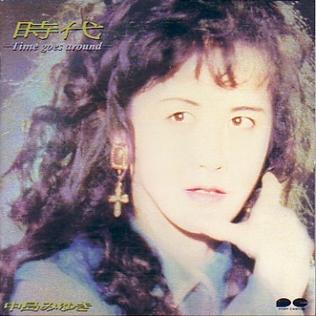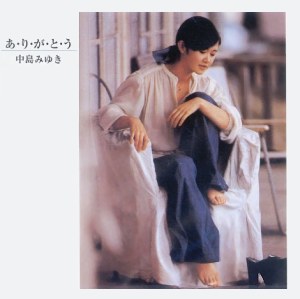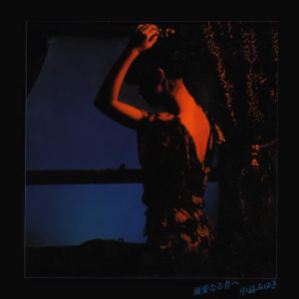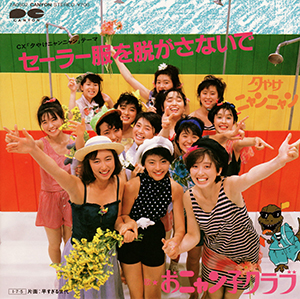Overview
This is the first Onyanko Club album to not contain any single A-sides. However, the B-side for "NO MORE Ren'aigokko", "Anata dake Oyasuminasai", was included. It is also the first album to feature numbers 38, 40, 41, 42, and 47, the first and last to feature numbers 43 through 46, and the last to feature numbers 6, 8, 13, 15 & 16 until the next album, Circle , was released. (Two members were not in Circle.)

Onyanko Club was a large all-girl Japanese pop idol group in the 1980s. Some members of the group participated in spin-off groups, such as Nyangilas, Ushiroyubi Sasaregumi and Ushirogami Hikaretai. Many of the latter two groups' songs were used as theme songs of the popular 80s anime series High School! Kimengumi and Tsuide ni Tonchinkan. Several big-name idols stemmed from the group; one of the best known being Shizuka Kudo. The group was produced by Hiroshi Ishida and Kazuji Kasai, both of whom were producers of Fuji TV's show Yūyake Nyan Nyan.

Shizuka Kimura, known by her maiden name Shizuka Kudo, is a Japanese singer, actress and former idol, born in Hamura, Tokyo, Japan. She was a member of Onyanko Club between May 1986 and September 1987 and went on to have a successful solo career with 11 number-one hits.

Hiroshi Yoshida was a 20th-century Japanese painter and woodblock printmaker. He is regarded as one of the greatest artists of the shin-hanga style, and is noted especially for his excellent landscape prints. Yoshida travelled widely, and was particularly known for his images of non-Japanese subjects done in traditional Japanese woodblock style, including the Taj Mahal, the Swiss Alps, the Grand Canyon, and other National Parks in the United States.

Jidai (時代), subtitled Time Goes Around, is the 21st studio album by Japanese singer-songwriter Miyuki Nakajima, released in October 1993. Like some previous materials such as Okaerinasai and Change , the album mainly consists of songs which she wrote for other singers.

Quadrophenia is the soundtrack album to the 1979 film Quadrophenia which refers to the 1973 rock opera Quadrophenia. It was initially released on Polydor Records in 1979 as a cassette and LP and was re-released as a compact disc in 1993 and 2001. The album was dedicated to Peter Meaden, a prominent Mod and first manager of The Who, who had died a year prior to the album's release.

Lisa Stansfield is the fourth album by British singer Lisa Stansfield, released by Arista Records on 21 March 1997. It was her first new studio album since 1993's So Natural. Stansfield co-wrote most songs for the album with her husband Ian Devaney. The tracks were produced by Devaney and Peter Mokran. Lisa Stansfield garnered favourable reviews from music critics and was commercially successful, reaching number two in the United Kingdom and receiving Gold certification. In the United States, it spawned four number-one singles on Billboard's Hot Dance Club Songs. Lisa Stansfield was rereleased as a deluxe 2CD + DVD set in Europe in November 2014.

In Person Friday and Saturday Nights at the Blackhawk, Complete, also called The Complete Blackhawk, is a 2003 four-disc collection of the 1961 live performances of the Miles Davis Quintet at the Black Hawk nightclub in San Francisco. These sets, performed with recording in mind, forged new ground for jazz musician Miles Davis, who had never previously been recorded live in a club with his combo. Material from the four sets was first released simultaneously by Columbia Records on two albums in September 1961, titled In Person Friday Nights at the Blackhawk, San Francisco, Volume 1 and In Person Saturday Nights at the Blackhawk, San Francisco, Volume 2. Although those albums were subsequently rereleased several times, the complete sets were not commercially available until Sony Records released a digital mastering of this collection. Simultaneous to this release, the material was made available as two separate double-albums, entitled Friday Night: In Person at the Blackhawk in San Francisco, Complete and Saturday Night: In Person at the Blackhawk in San Francisco, Complete. In conjunction with Sony, Mosaic Records released the 6 LP set.

Yoru o Yuke (夜を往け) is the 18th studio album by Japanese singer-songwriter Miyuki Nakajima, released in June 1990. The album includes remix version of "Ashita", a top-20 charting smash hit single released in 1989 and certified gold by the RIAJ. After two months from release of the album, "with" was released as a single. The song was featured in the 1991 film My Sons, directed by Yoji Yamada.

A Ri Ga To U (あ・り・が・と・う) is the third studio album by Japanese singer-songwriter Miyuki Nakajima, released in June 1977. The album features "On the Platform", a song later released as B-side of her breakthrough single "The Parting Song (Wakareuta)".
Ushirogami Hikaretai (うしろ髪ひかれ隊) was a Japanese idol J-pop band, active from 1987 to 1988. It was the third sub-group of Onyanko Club, consisting of three of its members: Shizuka Kudō, Akiko Ikuina, and Makiko Saitō, the group debuted during the "Onyanko Yumekojo Sailing 87'" tour.

Ninpen Manmaru (忍ペンまん丸) is a Japanese manga series written and illustrated by Mikio Igarashi. It was serialized in the Enix magazine Monthly Shōnen Gangan from 1995 to 1999. A 48-episode anime adaptation was produced by Shin-Ei Animation, directed by Tetsuo Yasumi, and broadcast on TV Asahi between July 5, 1997, and March 28, 1998.

Under the Sun is the 16th studio album by Japanese singer-songwriter Yōsui Inoue, released in September 1993.

Okaerinasai (おかえりなさい) is the sixth studio album by Japanese singer-songwriter Miyuki Nakajima, released in November 1979.

Shin-ai Naru Mono e (親愛なる者へ) is the fifth studio album by Japanese singer-songwriter Miyuki Nakajima, released in March 1979.

Never Enough: The Best of Jesus Jones is a compilation album/greatest hits album by British alternative rock/dance band Jesus Jones, released by the band's former record label EMI on 27 May 2002.

Rare and Unreleased is a compilation album by Curve, self-released only on their Bandcamp page, as digital download.
Minayo Watanabe is a Japanese idol and singer.She debuted as member number 29 of the idol group Onyanko Club. As she was one of the most popular members, in 1986 she started releasing solo songs. Her solo career continued after the group disbanded in 1987.

"Sailor Fuku o Nugasanai de" is the debut single by Japanese idol girl group Onyanko Club. It was released by Canyon Records on July 5, 1985. Its music was composed by Jun Satō, and its lyrics were written by Yasushi Akimoto.

Never Ending Summer is the third studio album by Kiyotaka Sugiyama & Omega Tribe, released by VAP on December 21, 1984. The album features the single, "Riverside Hotel," which peaked at #21 on the Oricon charts, while the album itself peaked at #8.

For You is the sixth studio album by Japanese singer-songwriter Tatsuro Yamashita, released in January 1982.


















